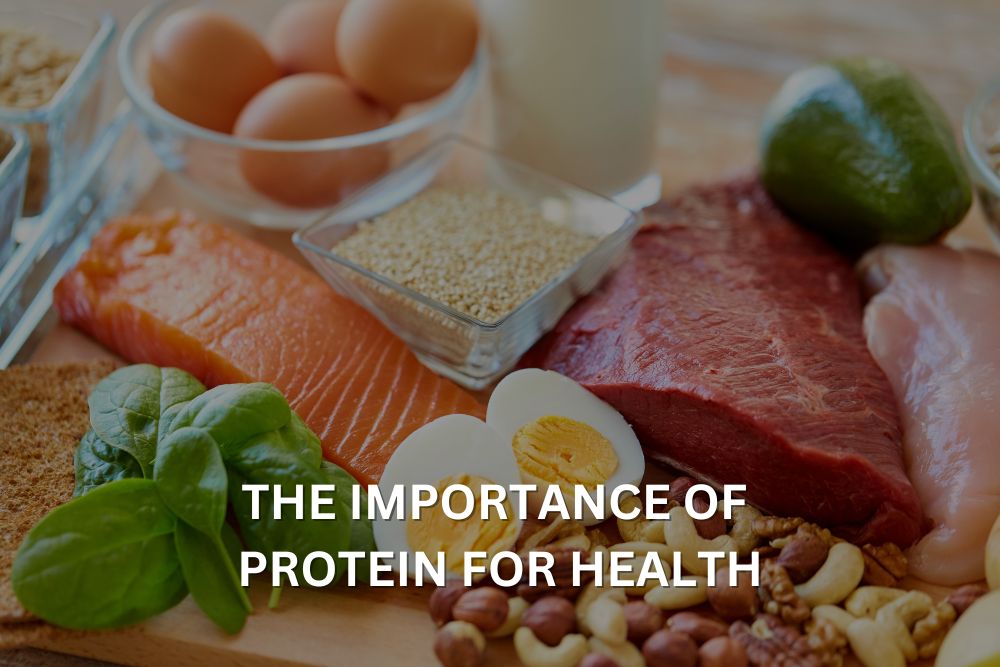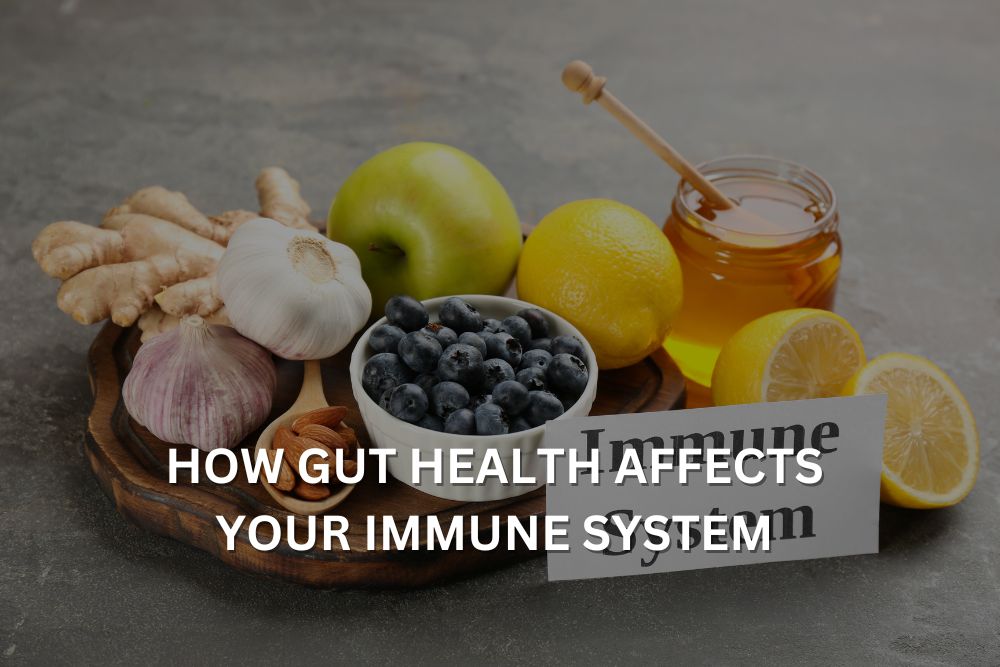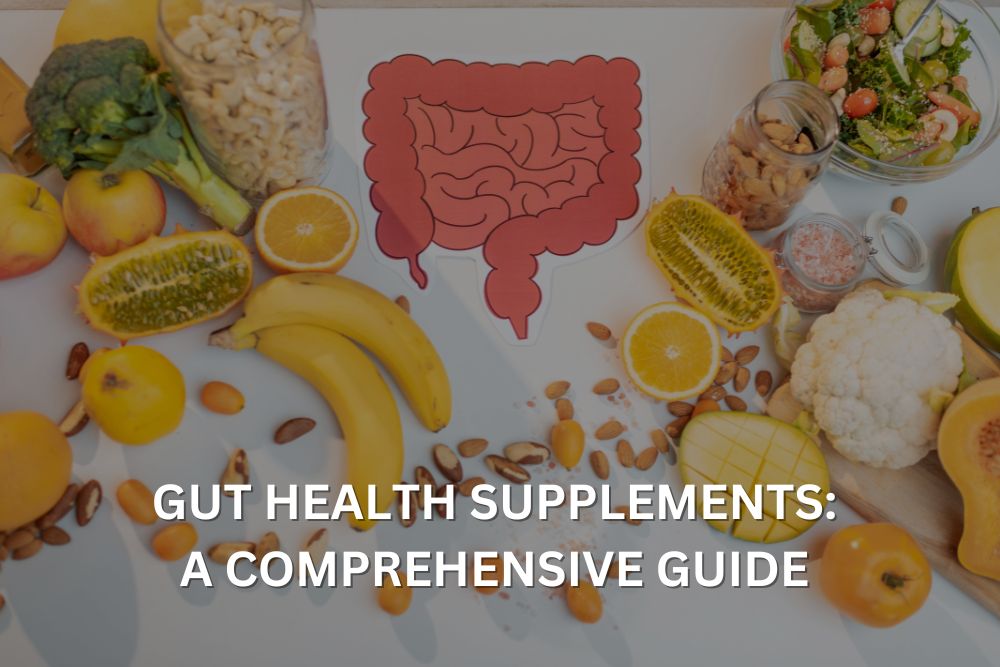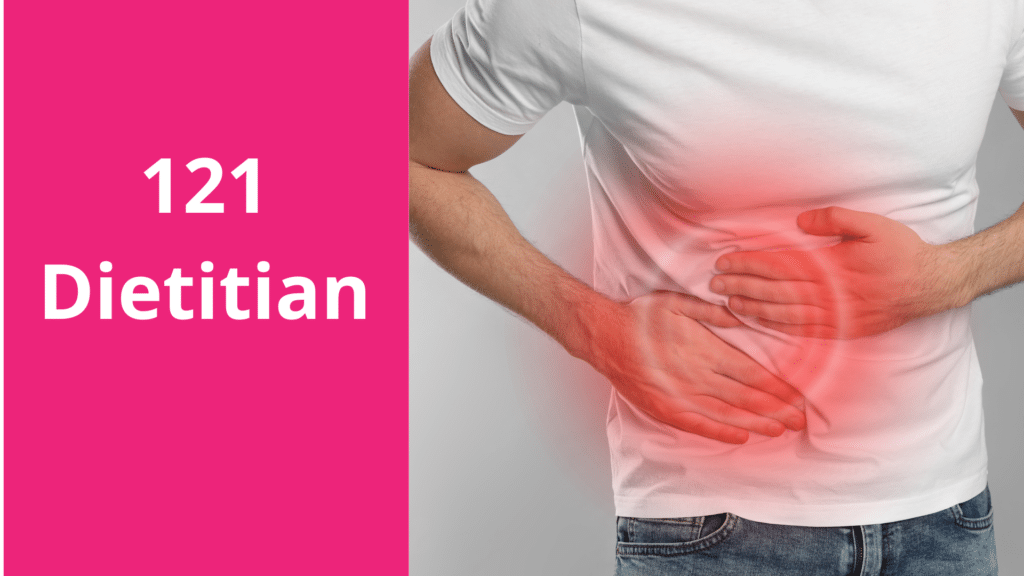The Importance of Protein for Health

Protein is one of the most essential nutrients your body needs to function optimally.
How Gut Health Affects Your Immune System

How Gut Health Affects Your Immune System As someone with 30 years of experience in Nutrition, its exciting times that we are now understanding how gut health affects your immune system. This is a topic that’s gaining more attention in the health world, and for good reason. Many people are curious about how what happens in our gut can influence our overall health, especially our ability to fight off illnesses. In this blog I will explore this connection and answer some common questions. What is Gut Health? Gut health refers to the balance of microorganisms living in your digestive tract. This includes bacteria, viruses, fungi, and other microbes. A healthy gut has a diverse range of these microorganisms, which play a crucial role in digestion, metabolism, and immune function. When the balance is disrupted – often due to poor diet, stress, or illness – it can lead to various health issues. The Gut-Immune System Connection Important Fact: About 70% of your immune system is located in your gut. This means that the state of your gut directly influences how well your body can defend itself against infections and diseases. Here’s how: Barrier Function: The gut acts as a barrier that prevents harmful substances from entering the bloodstream. A healthy gut lining helps keep out bugs and toxins. Microbiome Diversity: A diverse microbiome (a community of microorganisms that can usually be found living together) supports a strong immune response. Different types of beneficial bacteria help train your immune system to distinguish between harmful invaders and harmless substances. Production of Immune Cells: The gut microbiota produces various compounds that help stimulate the production of immune cells. These cells are essential for fighting infections. Inflammation Regulation: A balanced gut microbiome helps regulate inflammation in the body. Chronic inflammation can weaken the immune system and lead to various diseases. Common Questions About Gut Health and Immunity 1. How can I improve my gut health? Improving gut health involves several lifestyle changes: Eat a Varied Diet: Focus on whole foods rich in fibre, such as fruits, vegetables, whole grains, and legumes. These foods feed beneficial gut bacteria. Include Fermented Foods: Foods like yogurt, kefir, sauerkraut, and kimchi contain probiotics that promote a healthy microbiome. Stay Hydrated: Drinking plenty of water supports digestion and nutrient absorption. Limit Processed Foods: Reduce intake of sugar and artificial additives that can harm beneficial bacteria. 2. Are probiotics necessary? Probiotics can be beneficial for some individuals, especially after taking antibiotics or during times of stress. However, probiotics can trigger symptoms for those with issues with histamines and so it’s best to consult with a Dietitian before starting any supplements. 3. Can stress affect my gut health? Yes! Chronic stress can disrupt the balance of gut bacteria and lead to inflammation. It is always recommended to assess your current source of stress and reduce it where you can however many of us can not change this so practicing stress management techniques like mindfulness, yoga, or regular exercise can help maintain a healthy gut. Getting outside is super important to connect with nature. 4. How long does it take to improve gut health? Improvements can often be seen within a few days, or weeks of making dietary and lifestyle changes we see this in hundreds of our patients. However, everyone’s body is different; some may take longer to notice significant changes. 5. What are the signs of an unhealthy gut? Common signs include: Digestive issues like bloating, gas, or diarrhoea, constipation Food intolerances Unexplained weight changes Sleep disturbances or constant fatigue, anxiety Skin irritation Autoimmune conditions 6. Can gut health influence mental health? Yes, there’s a strong connection between gut health and mental well-being. The gut-brain axis is a bidirectional communication system between the central nervous system and the enteric nervous system of the gut. A healthy gut can positively impact mood, stress levels, and even cognitive function. Our programs and courses are renowned for improvements in this area. Tips for Supporting Your Gut Health Eat More Fibre: Aim for at least 30 grams of fibre each day from various sources. Incorporate Probiotic Foods: Include fermented foods regularly in your diet for added benefits. Limit Antibiotic Use: Only use antibiotics when necessary as they can disrupt your microbiome. Get Enough Sleep: Quality sleep is essential for maintaining a healthy immune system. Exercise Regularly: Physical activity promotes healthy digestion and reduces stress levels. Manage Stress: Chronic stress can negatively impact gut health. Try stress-reduction techniques like meditation or deep breathing exercises. Stay Hydrated: Drinking enough water is crucial for maintaining a healthy gut lining. Avoid Excessive Alcohol: Too much alcohol can disrupt the balance of gut bacteria. Eat Mindfully: Take time to chew your food thoroughly and eat without distractions. Consider Prebiotic Foods: Certain foods like garlic, onions, and bananas feed beneficial gut bacteria. The Impact of Diet on Gut Health and Immunity Your diet plays a crucial role in maintaining a healthy gut and, by extension, a robust immune system. Here are some key points to consider: Diversity is Key: Eating a wide variety of foods ensures you’re feeding different types of beneficial bacteria in your gut. Plant-Based Foods: These are rich in fibre and polyphenols, which are beneficial for gut health. Omega-3 Fatty Acids: Found in fish, flaxseeds, and walnuts, these can help reduce inflammation and promote a healthy gut. Limit Processed Foods: These often contain additives and preservatives that can negatively impact gut health. The Future of Gut Health Research As we continue to learn more about the gut microbiome, new therapies and interventions are being developed. From personalised probiotics to faecal microbiota transplants, the field of gut health is rapidly evolving. Staying informed about these developments can help you make better decisions about your health. Maintaining good gut health is vital for supporting your immune system and overall well-being. By making simple dietary changes and being mindful of your lifestyle choices, you can promote a healthier gut environment that enhances your body’s ability to fight off illness. Remember
Gut Health Supplements: A Comprehensive Guide

Gut Health Supplements: A Comprehensive Guide It’s everywhere! Thankfully the importance of gut health has gained significant attention in the world of nutrition and wellness and whatever you read; the gut is often referenced as being a significant contributor to the various health issues exploding around the world. I work as a registered dietitian at 121 Dietitian and I have helped thousands of patients with their gut health. One thing that all my patients cannot believe is once they have tackled their tummy problems they have noticed that this has significantly improved their overall well-being, mood, energy, mental health, weight and more. One way many people are looking to support their gut health is through the use of supplements and who can blame them – ideally a simple quick fix! Unfortunately, this is not always the case. In this article, we’ll explore the world of gut health supplements, their potential benefits, and what to look for if you do plan to go down this route. Understanding Gut Health Before we tackle gut supplements, it’s crucial to understand what we mean by ‘gut health’. The gut, or gastrointestinal tract, is home to trillions of microorganisms collectively known as the gut microbiome. This complex ecosystem plays a vital role in digestion, immune function, and even mental health. A healthy gut microbiome has a variety of good bacteria that work well with our bodies. Common Gut Health Issues Many people turn to gut health supplements to address various digestive issues, including: Bloating Constipation Diarrhoea Irritable Bowel Syndrome (IBS) Inflammatory Bowel Disease (IBD) Coeliac Disease Histamine Intolerance Food intolerances Leaky gut syndrome Types of Gut Health Supplements There are several types of supplements that can support gut health: Probiotics Probiotics are live bacteria that, when consumed in adequate amounts, can provide health benefits. They help to maintain or improve the balance of beneficial bacteria in the gut. Common probiotic strains include Lactobacillus and Bifidobacterium species. Prebiotics Prebiotics are types of dietary fibre that feed the beneficial bacteria in your gut. Common prebiotics include inulin, fructooligosaccharides (FOS), and galactooligosaccharides (GOS). Synbiotics These are supplements that combine both probiotics and prebiotics, providing a synergistic effect. Digestive Enzymes These supplements contain enzymes that help break down food, potentially aiding digestion and nutrient absorption. L-Glutamine An amino acid that plays a crucial role in maintaining the integrity of the gut lining. Collagen While primarily known for its skin benefits, collagen may also support gut health by helping to repair the gut lining. Herbal Supplements Certain herbs like peppermint, ginger, and fennel have been traditionally used to support digestive health. Choosing a Gut Health Supplement When selecting a gut health supplement, consider the following factors: Specific Strains: For probiotics, look for supplements that list specific strains, not just species. Different strains can have different effects. CFU Count: For probiotics, check the Colony Forming Units (CFU) count. This indicates the number of viable bacteria in each dose. Shelf Stability: Some probiotics require refrigeration to maintain potency, while others are shelf-stable. Quality and Purity: Look for supplements from reputable manufacturers that undergo third-party testing. Allergens: Check for any allergens or ingredients you may be sensitive to. Form: Supplements come in various forms including capsules, powders, and liquids. Choose one that fits your lifestyle and preferences. Potential Benefits of Gut Health Supplements While research is ongoing, some potential benefits of gut health supplements include: Improved digestion Enhanced immune function Reduced inflammation Better nutrient absorption Improved mood and mental health Alleviation of certain digestive symptoms It’s important to note that while supplements can be beneficial, they should not replace a healthy diet and lifestyle. A balanced diet rich in fibre, fruits, vegetables, and fermented foods is crucial for maintaining gut health. Case Study: Liz’s Gut Health Journey To show how gut health supplements can help, let’s consider our recent client Liz. Liz visited 121 Dietitian because she had chronic bloating and irregular bowel movements. Liz had struggled with these issues for several years. She tried many over-the-counter remedies, but they did not help much. She was feeling frustrated and it was impacting her quality of life. After a thorough assessment, we discovered that Liz’s diet was low in fibre and lacked variety. She also had a history of frequent antibiotic use, which can disrupt the gut microbiome along with being perimenopausal which can also add fuel to the flames. We developed a plan that included dietary changes and the introduction of a high-quality probiotic supplement. The probiotic we chose was specific to her needs and shown to support digestive health. Liz began taking a probiotic supplement every day. She also made the important dietary changes that were recommended to her in the Gut Health Program. She increased her intake to the correct type and amount of fibre-rich foods. After 2 weeks, Liz reported a significant reduction in bloating and more regular bowel movements. She felt more energetic and noticed her mood had improved as well. By the three-month mark, Liz’s gut health had dramatically improved. She no longer experienced chronic bloating, and her bowel movements were regular and comfortable and ….no more laxatives! Liz’s case shows that gut health supplements can help improve digestive health. Better eating habits also play a big role in overall well-being. Together, they can make a significant difference. Precautions and Considerations Gut health supplements can help many people. However, it is important to use them carefully. Talk to a Professional: Before starting any new supplements, it’s smart to talk with a healthcare professional. This is especially important if you have health conditions or take medications. Start Slowly: When you begin taking probiotics or gut health supplements, start with a low dose. Gradually increase the dose to help your body adjust. Be Patient: It can take time to see the effects of gut health supplements. Give it at least a few weeks before assessing their impact. Monitor Your Response: Pay attention to how your body responds to the supplements. If you experience any adverse effects, discontinue use and
Women’s Hormones and Gut Health: The Crucial Connection

Understanding how women’s hormones and gut health are connected is important for overall well-being. As a leading dietitian, Gillian Killiner emphasizes the importance of this connection. Hormones significantly influence gut health, and vice versa, making it vital to address both aspects for optimal health. The Role of Women’s Hormones in Gut Health Hormones are important chemicals that control many functions in women’s bodies, like metabolism, mood, and reproductive health. They are essential for keeping the body working properly. Estrogen, progesterone, and cortisol are important hormones for women that have a big impact on their bodies. Even small changes in hormones can cause many health problems like irregular periods, mood swings, and digestive issues. Maintaining hormonal homeostasis is therefore absolutely paramount for safeguarding women’s hormone cycle, overall health, wellbeing, and quality of life. Hormones play a key role in many important bodily functions, so it’s crucial for women to prioritize maintaining hormonal balance. So what do we need to consider…. Estrogen and Gut Health Estrogen, a key female sex hormone, exerts a profound influence on overall gut health. This important hormone helps shape the types of microorganisms in the gut, which are tiny organisms living in the digestive system. Estrogen helps protect the gut lining by keeping it strong and preventing harmful substances from entering the bloodstream. During menopause, lower estrogen levels can upset the balance in the gut, causing a condition called “leaky gut.” In this state, the gut barrier becomes more permeable, letting harmful substances pass through and enter the bloodstream. This permeability can lead to inflammation in the body. This inflammation can cause autoimmune disorders like inflammatory bowel disease (IBD), chronic fatigue, infertility, and other health issues. Understanding the importance of estrogen in maintaining gut health is crucial for women going through menopause. Taking steps to support gut health can help women stay healthy during this time of hormonal changes. Converesly when estrogen gets out of wack oestrogen dominance takes over. A healthy estrobolome helps maintain estrogen balance by regulating its levels in the body. Dysbiosis, or an imbalance in gut bacteria, can impair estrogen metabolism, leading to estrogen dominance or deficiency. This imbalance can contribute to conditions such as PMS, endometriosis, and polycystic ovary syndrome (PCOS). How does this occur? one group of offenders are Endocrine disruptors, such as environmental toxins. These can disrupt hormonal balance, potentially leading to estrogen dominance. Estrogen dominance can manifest in various symptoms, including menstrual irregularities, infertility, and weight gain. Gut health disruptions may exacerbate these symptoms, affecting overall well-being. Progesterone and Digestion Progesterone, another essential hormone, plays a pivotal role in regulating the menstrual cycle and sustaining pregnancy. Furthermore, this crucial hormone exerts a significant influence over gut motility. During the luteal phase of the menstrual cycle or pregnancy, imbalanced progesterone levels can slow down digestion. This can lead to symptoms such as bloating and constipation. These symptoms may be more severe if estrogen levels are also not balanced. Conversely, a low or diminished progesterone levels can trigger increased gut motility, consequently resulting in diarrhoea and discomfort. The balance of hormones like progesterone affects the digestive system. It’s important to keep hormone levels in check for good digestive health and overall wellbeing. Cortisol and Stress on Women’s Hormones Cortisol is a hormone that responds to stress in the body. It plays a big role in gut health through the gut-brain connection. Long-term stress can disrupt the balance of good bacteria in the gut. This can make it easier for harmful substances to pass through the gut lining. This stress-induced physiological response can significantly exacerbate the symptoms associated with irritable bowel syndrome (IBS) and other debilitating digestive disorders. The gut and brain are connected in a complex way. Changes in gut function can affect brain activity, and vice versa. Managing cortisol levels and stress is important for a healthy gut and reducing symptoms of conditions like IBS. Gut Health’s Impact on Hormonal Balance So how can your gut health impact on hormones? The gut microbiome is a complex system of trillions of bacteria, fungi, and other tiny organisms. It is increasingly seen as important for regulating hormones in the human body. A well-balanced, thriving gut microbiome can actively contribute to the harmonious regulation of our hormonal systems, helping to maintain optimal hormonal balance. On the other hand, an unhealthy gut can cause hormonal imbalances, showing how closely connected gut health is to hormone function. This growing understanding highlights the importance of nurturing a healthy gut microbiome as a means of supporting overall hormonal equilibrium and wellbeing. 7 Tips for Balancing Hormones and Improving Gut Health Eat a mix of fiber-rich foods, lean proteins, healthy fats, and fermented foods to help your gut stay healthy. Stay Hydrated: Adequate water intake is essential for digestion and overall health. Reduce stress and improve sleep by practicing techniques like yoga, meditation, and deep breathing exercises. This can help keep cortisol levels balanced. Get Regular Exercise: Physical activity promotes healthy digestion and hormone regulation. Think about probiotics: Probiotic supplements or foods like yogurt and kefir can help keep your gut healthy. However not maybe ideal if your gut health is not Limit Processed Foods and Sugar: These can disrupt gut health and contribute to hormonal imbalances. Fixing gut symptoms can help you eat more foods without issues. This can improve your hormonal health. Conclusion Wow, the intricate connection between women’s hormones and gut health is absolutely fascinating! The deep intertwining of these two vital aspects of our well-being is incredible. Understanding and addressing this powerful relationship can help women improve their health and quality of life. Isn’t that amazing? Gillian Killiner RD says it’s important to balance hormones and take care of your gut. This can be done through diet, lifestyle changes, and stress management. These factors are crucial for overall well-being. If you want to learn how to manage your hormones and gut health, it’s important to talk to a professional Dietitian. Gillian Killiner RD specialises in gut health and has won awards. She can provide you with the guidance you need.
How Gillian Killiner, Specialist GI Dietitian, Transforms Digestive Health

Gillian Killiner RD, a renowned Specialist GI Dietitian and the founder of 121 Dietitian, is on a mission to revolutionise digestive health care. With her wealth of experience and dedication to patient-centric care, Gillian empowers individuals with gastrointestinal (GI) conditions to navigate their dietary challenges and reclaim their well-being. In this blog, we delve into Gillian’s expertise and explore how she leverages her skills to make a positive impact on the lives of her patients. Meet Gillian Killiner: A Pioneer in GI Dietetics Gillian Killiner stands at the forefront of GI dietetics, pioneering innovative approaches to dietary management for individuals with GI conditions. With a passion for improving patient outcomes and a commitment to evidence-based practice, Gillian’s work has earned her widespread recognition as a leader in her field. Founding 121 Dietitian Driven by a desire to bridge the gap between nutrition and gastrointestinal health, Gillian founded 121 Dietitian 2008, a specialised dietetic service dedicated to supporting individuals with GI conditions. Through 121 Dietitian, Gillian offers personalised dietary guidance, empowering patients to achieve optimal digestive wellness. Gillian’s Approach to Patient Care Personalised Dietary Assessments At the heart of Gillian’s practice lies a commitment to individualised care. Through comprehensive dietary assessments, Gillian gains insights into each patient’s unique nutritional needs, medical history, and lifestyle factors. This personalised approach enables her to develop tailored dietary plans that address the specific challenges faced by her patients. Evidence-Based Interventions Gillian’s recommendations are grounded in the latest scientific research and best practices in GI dietetics. By staying abreast of emerging trends and advancements in the field, Gillian ensures that her patients receive the most up-to-date and effective dietary interventions available. Holistic Support and Education Beyond dietary recommendations, Gillian provides holistic support and education to her patients, empowering them with the knowledge and tools needed to manage their condition effectively. Through one-on-one counselling sessions, educational resources, and ongoing support, Gillian equips individuals with the skills to make informed choices and take control of their digestive health. How Gillian Helps Patients Navigate GI Conditions Managing Irritable Bowel Syndrome (IBS) Gillian specialises in assisting patients with conditions such as irritable bowel syndrome (IBS), offering tailored dietary strategies to alleviate symptoms and improve quality of life. By identifying trigger foods, implementing dietary modifications, and providing ongoing support, Gillian helps individuals with IBS regain control over their digestive health. Navigating Inflammatory Bowel Disease (IBD) For those living with inflammatory bowel disease (IBD), Gillian offers invaluable support in managing their condition through diet. By addressing nutritional deficiencies, optimising nutrient absorption, and advising on disease-specific dietary approaches, Gillian empowers patients with IBD to better manage their symptoms and enhance their overall well-being. Conclusion Gillian Killiner, Specialist GI Dietitian and founder of 121 Dietitian, is a beacon of hope for individuals struggling with gastrointestinal conditions. Through her expertise, compassion, and unwavering dedication to patient care, Gillian transforms lives by empowering her patients to navigate their dietary challenges with confidence and resilience. With Gillian’s guidance, individuals with GI conditions can embark on a journey towards improved digestive health and enhanced quality of life. If you want to book your programme TODAY we would love to help you. You can book a 121 Dietitian Programme today by clicking on the link below BOOK TODAY
How to Improve Gut Health in the UK

Understanding Gut Health Gut health is a very common concern that Gillian Killiner, our 121 gut specialist award winning Dietitian is asked to assess by Drs, Consultants, AHPs and patients who self-refer. She treats many every day, whether it be through online consultations or face-to-face in her clinic. If you’re not familiar with the concept of gut health, don’t worry! It’s a broad topic that encompasses various aspects related to different parts of the body, in addition to the gut itself and in the next few blogs we hope to cover these areas in more detail so you can get a better understanding. Gut Bacteria The gut microbiota, also known as gastrointestinal bacteria, is a diverse community of microorganisms that reside primarily in a part of the large bowel known as the colon, which is part of the digestive tract. This community includes bacteria, viruses, fungi, and other single-celled organisms. The gut microbiota plays a crucial role in various aspects of human health, and its composition can vary among individuals. A healthy gut not only strengthens our immune system but also supports the well-being of essential organs like the heart and brain. Moreover, it positively influences mood, fostering happiness and satisfaction. We know that when the gut is not balanced health is compromised at many levels. How are we able to assess our gut bacteria? Research into gut bacteria has been conducted since the invention of the microscope around 1665. Over the past 30 years, there has been a significant leap in this field, thanks to the sequencing of small molecules of life, including DNA and eventually RNA. What is Gut Health? The term “Gut health” is the umbrella term for various health conditions including : GERD Irritable bowel syndrome Hemorrhoids Coeliac disease Gallstones Constipation Diverticulitis Gastritis Ulcers Colorectal cancer Diarrhoea Gastrointestinal infections Liver disease Pancreatitis Esophageal cancer Gastroparesis Years of research and work in practice link these conditions to our gut bacteria whether as a direct cause, preventative or used as a treatment. In addition extensive research has also been linking the vital organs like brain, heart, liver, skin to our gut bacteria and how imbalances in the gut microbiota can lead to increased intestinal permeability or “leaky gut,” allowing harmful substances to enter the systemic circulation and burdening liver function. We know the health of our skin is closely linked to our gut health due to their shared immune system involvement. Research indicates that disruptions in the balance of intestinal flora may contribute to skin conditions like acne, eczema, psoriasis, rosacea, and dermatitis. The gut-brain axis is a bidirectional communication system between the brain and the GI tract. Treating the gut can directly assist mental health and well-being. Our Gut Health Programme is adapted to suit all gut health issues and more. Excellent Gut Health Ensuring excellent gut health at every age is crucial for overall wellness. An effective digestive system also promotes efficient nutrient digestion and absorption, which subsequently enhances sleep quality. Hence, giving priority to gut health is highly recommended. × Dismiss this alert. Dietitian’s Role in Managing Digestive Disorders A dietitian plays a crucial role in managing digestive disorders by providing tailored nutritional guidance to alleviate symptoms, promote digestive health, and improve overall well-being. Our 121 Gut Health Programme has helped thousands of people not only regain control of their bowel symptoms and health but also improve their sleep, mental clarity, weight and other health issues. How does 121 Dietitian work to improve Gut Health? At 121 Dietitian we work closely with other healthcare professionals to aid in the diagnosis and treatment of digestive disorders. We perform detailed individual assessments take a deep dive into the detail in our 60-minute consultation before writing up a detailed bespoke plan, supplement and lifestyle protocol. Before attending an appointment, our patients are required to log in to our online Portal to complete our background questionnaire and Food and Symptoms Diary. This part of the programme is completely free of charge and allows one of our specialist dietitians to direct you to select the correct programme. The programme includes a 30-minute review to ensure the programme has been successful and provide further nutritional advice and guidance as part of the programme requirements. Mairead AdamsGoogle Review Read More After having COVID at the end of 2022 I suddenly developed allergies to Milk products and intolerances to other foods. My Gastroenterologist recommended I see Gillian, who put me on her low Fodmap Programme at the end of September and I am now at the Reintroduction Stage. Since commencing the Programme, my bowel movements and general health have improved dramatically. I sleep better and a number of my aches and pains have gone. After having diarrhoea for 9 months, effectively, I can now go out and about without that worry of knowing if I will be close to a toilet and if I will be able to get there on time, to constantly carrying Immodium, just in case. The peace of mind this has given me is enormous, never mind that I now feel more like a ‘normal’ person. I still have to watch what I eat, especially in relation to my milk allergy, which may take a bit longer to ‘fix’, if it can be fixed. However, the change in me is amazing and I am extremely grateful to Gillian for her time, advice and patience in getting me to this point. Thank you Gillian. How a Specialist Dietitian can fix your Gut… Specialist gastrointestinal Dietitian Gillian Killiner brings her 26 years of dietetic experience to help each patient she sees. Her deep dive is extensive – here are just some of the areas covered…. Fibre Management We guide patients on appropriate fibre intake, considering the type and amount of fibre that can aid in digestion without causing discomfort. Food Allergies and Intolerances We identify and address food allergies or intolerances that may contribute to digestive issues.Recommend suitable alternatives to replace problematic foods. Hydration We emphasise the importance of adequate